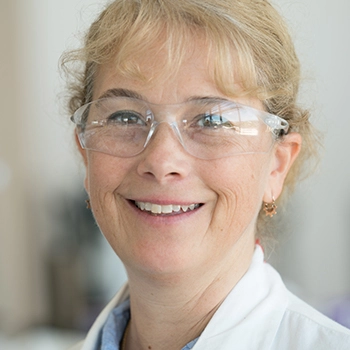
Many people who work in the healthcare industry do so because they want to help people. For Marjorie Eiref, family also plays a key role. Eiref, who serves as Head of Operations for Neuroscience Research at Novartis, explains how her family medical history has helped shape her 25-year career in pharmaceutical research operations.
What motivates you to work in the healthcare industry?
I have worked in pharmaceutical research operations for 25 years. The reason that I love my work and why I wake up every morning excited about coming to Novartis is because I’m very passionate about drug discovery, specifically in the neuroscience field. One in three Americans is affected by a psychiatric or neurodegenerative disease. I have a brother who is autistic. He is 47 years old and lives in a group home. I am his legal guardian. My uncle was a Vietnam veteran with classic schizophrenia. My grandmother had Alzheimer’s, and I watched her slow debilitation. When I sit in lab meetings or in leadership team meetings, I am always thinking about my family and how our research and decisions relate back to all affected patients and their families and caregivers. Every decision we make in early research has an impact eventually on these people and their comfort, happiness and livelihood.
You can do it! Work hard. Stay focused. Help others. Have fun. It’s all good!
Marjorie Eiref, Head of Operations, Neuroscience Research
What personal qualities or experiences have you leveraged to achieve your goals?
My three greatest personal strengths are compassion, loyalty and courage. But I think my vulnerabilities and weaknesses are the things that have made me stronger in my life. I have been a single mom for over 12 years. Both of my children are happy and doing well in their university studies. But the early years, when they were younger and I was working full-time, were very challenging. One of the ways that I survived was to be actively involved, to always volunteer whenever I could help out with watching other people’s children [and] helping at soccer games or school events. I never knew when I might need to call in a favor from someone else. This applies to our careers; if you do things to help your community – truly support other people – it always comes back to help you. Karma exists. It is important to be generous and supportive of others. It takes a village to accomplish many things, and we have an amazing community at Novartis.
What opportunities have helped you advance in your career, and how will you pay it forward?
I have been very fortunate. The first woman who I worked for was not just a manager but a mentor. Since then, it has always been very important for me to mentor other people, especially women. When people reach out for advice about career development, professional job skills, recruitment opportunities, I am always eager to help or share my perspective. It is important to network and bridge our knowledge and skills with others.
Marjorie Eiref, one of our #WomenInScience, says her personal connection to certain diseases is the motivation behind her work



